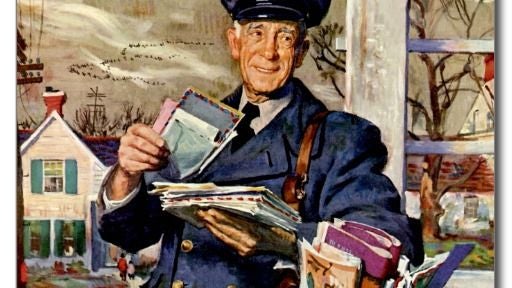WHEN THE POSTMAN DIDNT RING AT ALL
George Monteiro
The film Il
Postino celebrates the friendship that gradually emerges between Pablo
Neruda, the
Postino celebrates the friendship that gradually emerges between Pablo
Neruda, the
exiled Chilean poet in exile, and his, at first,
illiterate postman. I’m reminded that something
of
illiterate postman. I’m reminded that something
of
the sort, but with significant differences, emerged for
me when I was living in Brazil decades
me when I was living in Brazil decades
ago. Although we
never warmed up to each other, as Neruda and his postino do in the movie, we
never warmed up to each other, as Neruda and his postino do in the movie, we
did smile and greet each other when the postman showed
up at the apartment building where I
up at the apartment building where I
was living. Since
he usually came at the same time each day, whenever I could do so I waited
he usually came at the same time each day, whenever I could do so I waited
for him downstairs.
Then one day he did not show, then a second day, and finally every day
for
Then one day he did not show, then a second day, and finally every day
for
two weeks. I
would look up the street to see if I could spot him but to no avail. On my way to
would look up the street to see if I could spot him but to no avail. On my way to
work one day I spotted a postman having his cafezinho in a bar up the street. I asked him about
the whereabouts of our mailman. His answer was that he was our mailman now, since
our
our
regular mail-carrier had died two weeks since. I was shocked. I told him that the news saddened
me, but did he have any accumulated mail for me. He said no, that there was no backlog, no
accumulated mail for the route. "But where is it?" I asked, not
knowing what to expect. It was
knowing what to expect. It was
gone; he said. It had just disappeared. And the upshot was that I never did get that
mail. Small
mail. Small
wonder my U. S. correspondents were first annoyed that I
hadn’t replied to their now lost letters
hadn’t replied to their now lost letters
and then
skeptical as to the "truthfulness" of my explanation.
skeptical as to the "truthfulness" of my explanation.
George Monteiro is a lifelong student and teacher of nineteenth- and twentieth-century American literature, contributing to the scholarship on numerous writers, including Edgar Allan Poe, Henry Adams, Henry James, Emily Dickinson, Edith Wharton, Stephen Crane, Ernest Hemingway, F. Scott Fitzgerald, William Faulkner, Robert Frost, T. S. Eliot and Bob Dylan. His latest book is Elizabeth Bishop in Brazil and After: A Poetic Career Transformed (McFarland, 2012).




